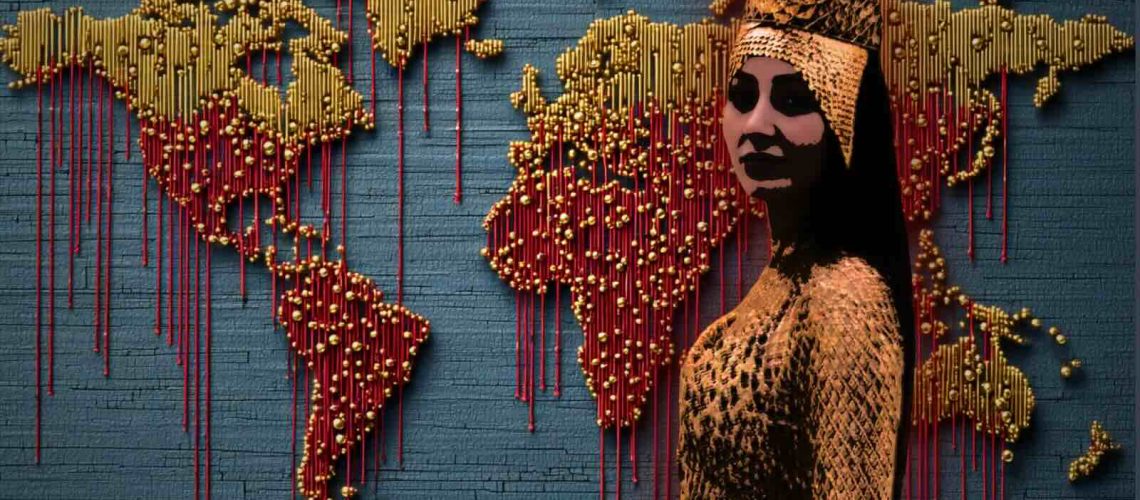Parts of this chain of labour exploitation have been directly linked by human rights investigations to the unofficial economies that surround the extraction and export of gold. In North Darfur and the Blue Nile, villagers, including children, were forced to labour in militia-controlled mines under armed supervision, frequently for no pay and in hazardous conditions, according to a 2024 Amnesty International field report. Private traders with established ties to Dubai’s markets and networks connected to the RSF then sell the gold extracted in these situations. These results are consistent with Human Rights Watch’s 2023 warning that forced labour in Sudan’s mining areas was “systemic and tied to the country’s wider conflict economy” rather than isolated.
The UAE’s Political Economy: Interests, Investments, and Influence
Why would the United Arab Emirates deliberately foster an excessive interest in gold? The solution lies at the nexus of geopolitical strategy and economic diversification. Finance, tourism, aviation, logistics, and commodity trading are all essential components of the Emirates’ long-term goal to lessen their dependency on oil and develop alternate sources of income and power. Possessing a leading position in the world’s gold market offers financial leverage, liquidity, and geopolitical clout.
A deeper geopolitical project unfolding on the African continent is revealed by the UAE’s increasing dominance in the world gold trade, which goes beyond simple economic ambition. Abu Dhabi has incorporated itself into Sudan’s precarious economy by investing in ports, mining, and logistics, turning business endeavours into tools of influence. These connections, which are presented as partnerships and development, have come to resemble the workings of a contemporary colonial enterprise.
The UAE’s role has come under scrutiny as the conflict in Sudan has intensified. Abu Dhabi has reportedly supported the Rapid Support Forces (RSF), directing material and financial assistance that subtly feeds the conflict. Through Emirati networks, gold taken from Sudanese territory has been used to fund armed groups and strengthen economic reliance. Sudan’s instability is now a tool for influence rather than a problem to be solved, as the UAE’s pursuit of regional dominance and resource control has effectively contributed to the continuation of one of Africa’s most catastrophic conflicts.
According to a recent Amnesty International investigation, the RSF is using 155 mm AH-4 howitzers and sophisticated guided bombs made in China, which the group claims were most likely re-exported by the UAE, on the battlefields of Sudan. By directing these heavy weapons into the conflict area, the UAE appears to have broken the UN arms embargo on Darfur, according to another report by Al Jazeera. This means that what could be portrayed as the arms or commodity trade is actually directly arming one of the warring factions.
Logistics and transit networks connected to the United Arab Emirates supplement this arms flow. The Straits Times reported that cargo planes connected to UAE networks have moved weapons and equipment to RSF-controlled areas via regional airports, shifting the balance of power and extending the conflict in Sudan. In the meantime, the UAE’s role in providing equipment is described as a “tangible fact” in direct statements from Sudan’s military and UN sanctions monitors. Instead of being a domestic issue that needs to be resolved, such interventions transform the war in Sudan into a strategic advantage for external parties.
The diplomatic fallout is getting worse. Citing the UAE’s backing of the RSF as a breach of Sudanese sovereignty, the Sudanese Government declared in May 2025 that it would cut diplomatic ties with the country. The UAE retaliated by refusing to provide weapons, but the regularity of independent investigations by Amnesty International, UN monitors, and human rights organizations indicates that the UAE’s involvement is more extensive and profound than its public denials acknowledge. This implies that a state with ties to international finance and the commodity trade is materially complicit in the continuation of one of the biggest humanitarian catastrophes in history.
China’s Role: Buyer, Investor, and Systemic Enabler
The situation is made more complex by China’s involvement. Beijing and Sudan have a long history of strategic and commercial ties that go beyond infrastructure and oil agreements to include mining and building. Chinese businesses have long operated in Sudan’s extractive industries, and Beijing’s voracious appetite for commodities contributes to the structural demand for gold. Through trading hubs, gold is imported by buyers from around the world, including Chinese companies and state-affiliated buyers. There is evidence that some of the metal that reaches UAE markets is then sold to buyers in Asia, including China.
The UAE-China partnership is also significant. The Emirates are a desirable middleman for metal headed for Chinese markets because of their financial and trade ties, which include agreements that permit gold trading in yuan on Dubai exchanges. In summary, the chain becomes less transparent at each stage as a piece of Sudanese gold moves from an artisanal mine to a middleman, a refinery in Dubai, and finally an Asian buyer. The UAE’s ability to refine and trade, along with Chinese demand, creates a bilateral dynamic that makes it possible to monetize supplies that are not properly regulated.
Evidence suggests that China is indirectly escalating the conflict by providing weapons and munitions that wind up in the hands of both sides, even though the Sudanese Armed Forces (SAF) and the Rapid Support Forces (RSF) are the parties to the official conflict. Newly produced Chinese small arms, mortars, and ammunition have been reported on battlefields in Darfur and wider Sudan, according to a 2024 briefing by Amnesty International. For instance, the report states that “recent Chinese small arms are widely present in other parts of Darfur and wider Sudan” and that Chinese-made 82 mm PP87 mortar bombs were observed in East Darfur.


